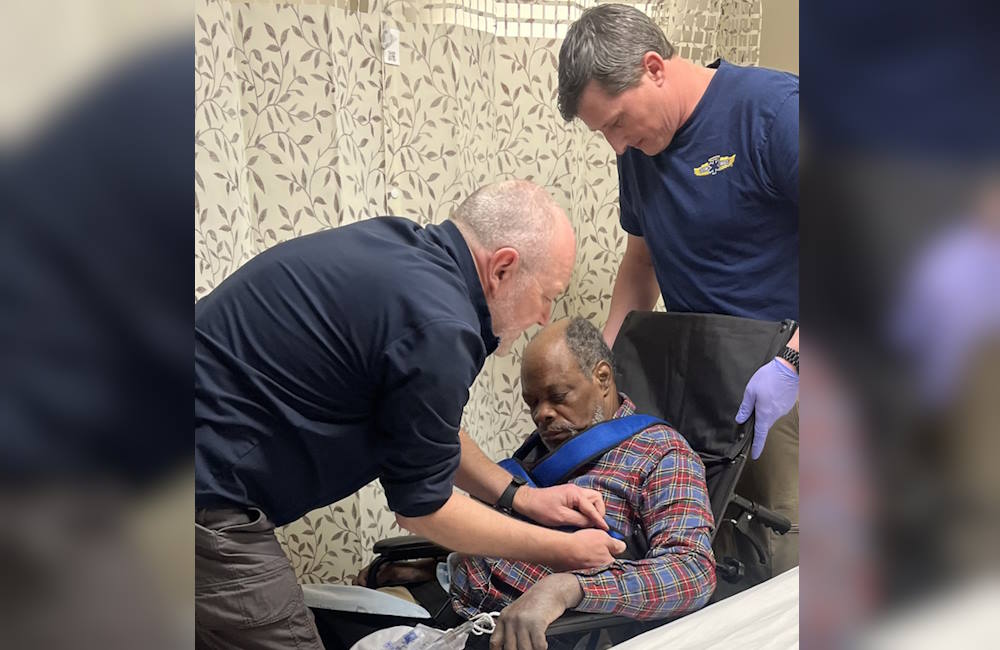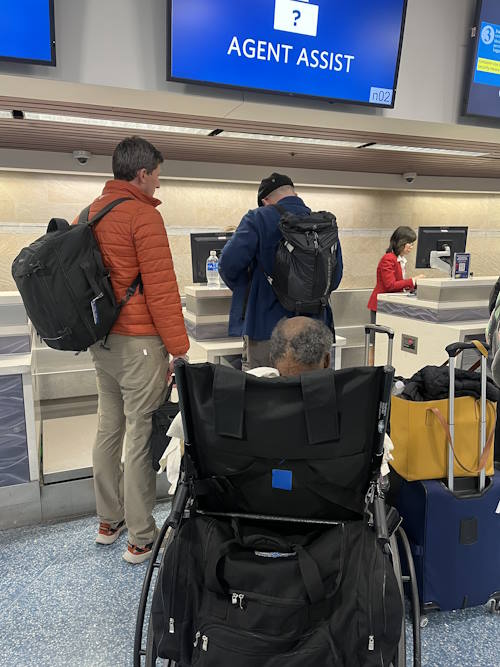


Hospital Discharge Planning
A healthcare situation that requires a trip to the hospital can be an anxiety-inducing, stressful time for families. It’s only natural that everyone focuses on the medical treatment and doesn’t give much thought to hospital discharge planning.
But how people plan for what happens when they leave the hospital after discharge plays an important role in their health going forward. Over the years, experts have learned that better hospital discharge planning leads to better health outcomes.
Everyone plays a role in hospital discharge planning. This includes patients, family, caregivers and healthcare providers. The following looks at some of the key points when you leave the hospital after discharge. All are important factors to consider for hospital discharge planning.
What Happens When You Get Discharged From a Hospital?
Only a doctor can authorize a patient to get released from the hospital. In most hospitals, a hospital worker meets with patients and family to deliver discharge instructions. This could be a social worker, nurse, case manager or other healthcare professional. They will go over information they need to make the transition home. They show patients paperwork that lists all the procedures and treatments received. Patients need to verify the accuracy of the information, because it’s what they base a hospital bill on.
What Is Hospital Discharge Planning?
Hospital discharge planning involves a process for making a plan in advance on all the issues involved in transitioning from the hospital to home. For the hospital, discharge involves a team approach. That should also be the case with patients.
Hospital discharge planning typically breaks down into the following three major areas.
Asking Questions
When meeting with the hospital discharge planner, it’s important to have questions ready. Some of the typical questions patients need answered include:
- What’s my medical condition status?
- When do I need to see the doctor again?
- What are the details on the medication I am taking once I get home?
- How do I operate any equipment I need (wheelchairs, walkers, etc.)?
- How active can I be after discharge, or how long should I wait to be active after discharge?
Transportation Home
Patients either transition to their home or to another care facility. In either case, safe transportation is needed. Some prefer turning to professional non-emergency medical transport such as Flying Angels to handle these trips. They provide experienced nurses to travel with patients and ensure they receive quality medical care as they transition out of the hospital.
How Do You Book Medical Travel?
Help at Home
Another key issue for patients is planning for care once they get back home. Some of the common needs include cleaning the house, cooking, shopping, laundry, personal care if needed (such as help with bathing and dressing), emotional care and healthcare (such as managing medications). Hospital representatives should have information about government-funded services and non-profit organizations that can help with such services. Family and friends can also help track down different services.
If a patient thinks they will need to hire services, don’t wait until the last minute and make a hasty decision. Prices and level of service vary greatly in this area. It’s important to take some time and look around for the best choice to fit your circumstances. Planning on these key issues can give patients a level of comfort they need as they prepare to transition back home. Patients do well to take the initiative and plan ahead. That ensures they make a safe and healthy transition when they leave the hospital after discharge.

What is Hospital Discharge Transportation?

Hospital discharge transportation involves the methods used to transport a patient from the hospital to their home, a rehabilitation center, nursing home or other care facility. How hospitals and patients handle hospital discharge transportation is a key element to the success of overall medical treatment.
It’s an issue that all healthcare providers address. Hospital discharge transportation is seen as part of a comprehensive approach to patient care. That applies whether the patient needs medical transportation home or to another facility.
In some cases, transportation may involve having to fly commercial after surgery. This happens when patients are injured while on business travel or vacation. It also is necessary for those who must fly to get care from a specialist surgeon.
How to Fly Commercial After Surgery
Why Discharge Planning Is Important
Medical professionals put a great deal of focus on discharge planning process because transportation from a care facility is a time when people are vulnerable. Every detail of hospital discharge transportation focuses on patient safety, including medical transportation home.
Also, effective discharge lowers the chance of a patient returning to the hospital because patients and their families are prepared for the transition. That’s why addressing the patient’s traveling requirements is critical.
In situations where flying is involved, hiring a non-emergency medical transport service is often the right move. They provide service that includes making all travel arrangements, including ground transportation, navigating the airport and flight reservations.
They also provide a flight nurse who is certified in aviation physiology and can handle any medical situations that may arise while in the air.
Emergency vs. Medical Transport
How Discharge Planning Works
When working on discharge planning, medical staff find the best way to provide a smooth transition from one facility to another, or to the patient’s home. Only doctors can authorize discharge from a hospital. However, social workers, case managers or nurses often oversee discharge planning.
According to the National Center on Caregiving (NCC), discharge planning revolves around the following issues.
- Evaluation. Qualified personnel evaluate the patient’s condition.
- Discussion. A patient or her representative discuss discharge with qualified personnel
- Planning. Plan revolves around either going home or to another institution.
- Determining. Qualified personnel determine whether the patient’s caregiver needs training or other support
- Referrals. The medical facility refers the patient to the appropriate support service, such as a home health agency
- Follow up. Discharge planning also involves making arrangements for follow-up appointments or tests for the patient.
Many medical facilities continue to work in this critical area, so it’s important for patients to know their options and the challenges involved with discharge. For example, research reported by the NCC indicates about 40% of patients over the age of 65 had medication errors upon release from the hospital. Also, about 18% of Medicare patients discharged from hospitals are readmitted within 30 days. Those numbers underscore the importance of hospital discharge transportation. For patients who know they have an upcoming hospital stay, all options – including non-emergency medical transportation – should be investigated.

NEMT for Critical Care: Bridging the Gap from Hospital to Home Care

Transitioning from hospital to home care can be especially challenging, particularly for critically ill patients requiring a higher level of care. Ensuring a smooth transition is essential for these patients’ recovery. One valuable resource, throughout the transportation process, is non-emergency medical transport (NEMT) services.
NEMT companies that specializing in critical care travel offer patients and their reassurance, knowing they are in the care of highly skilled medical professionals. This includes critical care transport nurses and coordinators who oversee patients’ care and manage all travel arrangements.
As a NEMT company, Flying Angels specializes in making travel arrangements and providing flight nurses to accompany patients flying on commercial airlines. They also coordinate ground transportation services, ensuring patients who have received critical care can safely return home from the hospital.
Critical Care Transport Issues Addressed by NEMT
NEMT services are increasingly part of hospital discharge plans, ensuring that patients safely transition from hospital to home. This is available to all patients, including those treated in critical care units.
NEMT plays a vital role in bridging the gap between hospital and home care. It ensures patients return home safely to continue their recovery and potentially avoid complications leading to readmission. Some of the issues NEMT services address include:
Accessibility. Patients may lack reliable transportation, post-hospitalization, especially if they are recovering from surgery, or have mobility limitations. NEMT offers a safe and comfortable way for them to get home, eliminating reliance on potentially unavailable or overburdened family or friends.
Professional care. NEMT companies such as Flying Angels provide experienced flight nurses who accompany patients during both air and ground transportation. Additionally, Flying Angels provides necessary medical equipment like customized reclining wheelchairs.
Continuity of Care. The timely transition from hospital to home care is key. NEMT ensures patients arrive home in a timely manner to begin their at-home recovery plans involving medication, therapy, and/or wound care. Delays can disrupt this plan and lead to complications, highlighting the importance of NEMT in ensuring patients arrive home promptly.
Improved Recovery. Returning to familiar surroundings can significantly aid in the recovery process. NEMT facilitates earlier returns home, allowing patients to rest and heal in a familiar and comfortable environment.

NEMT Companies Equipped to Handle Critical Care Transport
NEMT services specialize in providing transportation solutions for individuals with medical needs outside emergency situations. For critically ill patients transitioning from the hospital to home care, NEMT services offer a lifeline, bridging the gap between the two.
NEMT providers can offer specialized vehicles equipped to accommodate diverse medical needs. The reclining wheelchair used by Flying Angels, for example, allows nurses to transfer patients from bedside to chair and into a wheelchair van. If the trip home requires a flight, patients remain in the wheelchair until they arrive at the aircraft, where they are then transferred into a first-class seat, using custom transfer slings.
NEMT critical care transport nurses are trained in basic life support, medical equipment operation, and patient transfer protocols to ensure patient safety and comfort during transit. Continuous monitoring helps maintain the patients’ stability and minimizes complications, ensuring a smooth transition from hospital to home.
NEMT Coordination with Medical Providers
By working closely with hospitals, healthcare providers, and home care agencies to coordinate transportation schedules, NEMT companies ensure timely pickups and drop-offs. This streamlines the transition process, reducing delays and ensuring continuity of care for patients.
As an experienced NEMT company, Flying Angels prioritizes patient comfort and dignity, offering personalized transportation solutions tailored to patients’ specific needs. Whether assisting with mobility or accommodating medical equipment, NEMT providers strive to make the transportation experience as comfortable and stress-free as possible.
Navigating the transition from hospital to home represents a critical phase in the journey of critically ill patients. NEMT services are indispensable in this transition, providing specialized transportation solutions that support continuity of care, improve patient outcomes, and enhance the overall healthcare experience for patients and their families.

Collaborating with NEMT Providers: Enhancing Post-Discharge Outcomes

In modern healthcare, the focus is increasingly shifting towards holistic patient care that extends beyond hospital walls. One critical aspect is hospital discharge planning. This phase is pivotal in ensuring patients transition smoothly back to their homes or care facilities, minimizing the risk of readmissions and improving overall health outcomes.
One vital player in this process is non-emergency medical transport (NEMT) providers. Collaborating with NEMT services significantly enhances post-discharge outcomes, ensuring patients receive the care and support they need beyond hospitalization.
The Importance of Post-Discharge Care
Patients who have undergone medical procedures or are recovering from illnesses may not be fit to drive themselves home. Experienced NEMT providers offer hospital discharge planning services that involve trained professionals, including experienced nurses, who are familiar with handling patients requiring special assistance or medical monitoring during transportation, ensuring their safety throughout the journey.
It’s an important issue because patients often face various challenges upon discharge, including transportation barriers. These challenges can lead to medication non-adherence and ultimately, hospital readmissions. Nearly 20% of Medicare patients are readmitted within 30 days of discharge, costing billions annually, according to the Agency for Healthcare Research and Quality (AHRQ).
Effective post-discharge care is essential not only for improving patient well-being but also for reducing healthcare costs and alleviating the burden on healthcare systems.
The Role of NEMT Providers in Hospital Discharging Plan
NEMT providers play a crucial role in addressing transportation barriers, and ensuring patients return home safely and have access to essential healthcare services post-discharge. These providers offer specialized transportation services for individuals who are unable to use conventional means of transportation due to medical conditions or disabilities.
By collaborating with hospitals and healthcare facilities, NEMT providers can bridge the gap between healthcare services and patients’ homes. For example, Flying Angels coordinates hospital discharge transportation for transferring patients from their homes or to another care facility.
In situations where flying is involved, hiring a non-emergency medical transport service is often the right move. They provide a service that includes making all travel arrangements, including ground transportation, navigating the airport, and flight reservations.
The Benefits of Including NEMT in a Hospital Discharge Plan
Building a strong relationship with NEMT providers can yield significant benefits for both patients and healthcare institutions. Reliable transportation ensures patients travel safely, and in a much less-stressful way, back home. Timely pick-up and drop-off, coupled with a comfortable ride experience, contribute to a positive patient experience.
Improved adherence to treatment plans and follow-up appointments can also lead to lower overall healthcare costs. Effective communication in healthcare also ensures smoother transitions between healthcare settings and improves care continuity.
Including NEMT in a hospital discharge plan also provides clear communication and standardized processes that minimize scheduling errors and delays.
The Future of Hospital Discharge Planning
An increasing number of healthcare providers are including NEMT services as part of their hospital discharge plan. Some are exploring strategic partnerships with NEMT companies to provide patient transportation home from the hospital, including addressing the needs of specific patient populations with complex needs.
Collaboration between healthcare providers and NEMT services is essential to ensure seamless transitions and improve post-discharge outcomes. By prioritizing patient-centered care and leveraging the expertise of NEMT providers, healthcare organizations can enhance the quality of care delivery and ultimately improve the health and well-being of their patients.